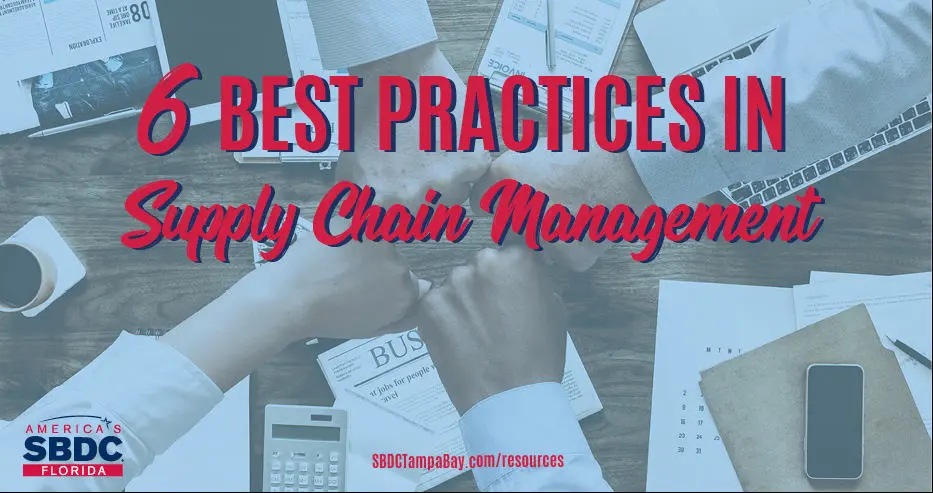6 Best Practices in Supply Chain Management
by Yolanda Goodloe | December 6, 2019
Manufactures in the federal marketplace supply chain are increasingly becoming more vulnerable to cyberattacks and counterfeiting attempts. Consequently, a strong supply chain can also help companies mitigate risk, eliminate business disruption and protect internal operations.
In order to improve supplier quality, many business owners rely on Supplier Quality Management which requires a significant investment in systems and process. By deploying these best practices, manufacturers can dramatically improve their supplier quality and achieve their own business objectives.
The most successful supply chains are in complete sync with the long-term company strategy and the annual business plan. The following practices will allow any business owner or manufacturer to dramatically improve their own supplier quality.
Best Practice #1: Measure and Track Cost of Poor Supplier Quality
Using metrics, or Key Performance Indicators (KPI), allows you to measure how well the business is performing. Though these KPIs can be very useful, to some, they may be very confusing at the same time if you don’t understand how to interpret the data. Many of these metrics, such as inventory carrying costs, cash‐to‐cash cycle time, fill rates, etc.; can provide companies with valuable details regarding their efficiency. For instance, cash-to-cash cycle time can give a business owner insight into how long their operating capital will be tied up. Adversely, the faster your cash-to-cash cycle time, the leaner and more profitable the supply chain is.
Best Practice #2: Cost Recovery Analysis
To counter this, businesses can implement a cost-recovery system in which suppliers are charged for providing poor quality of components. It’s important to note that more than half of these costs are non-material, such as operator handling or quality department handling.
Best Practice #3: Supplier Audits
In order to determine whether the process conforms to planned arrangements, an audit of customer related processes should be conducted in planned intervals. This will help determine whether the process is properly implemented and maintained and will provide process performance information to top management. To identify the level of compliance with each requirement that is set out in the standard, it is critical for manufacturers to engage suppliers in all aspects of their quality management system. This ensures that the supply-base is fully integrated into the Quality Management System (QMS) being rolled out.
Best Practice #4: Supplier Scorecards
The supply chain system should be aligned with overall company strategy. Focusing on key operational metrics manufacturers can rank a supplier’s relative performance and track their quality over time using key performance indicators. This supplier scorecard can generate data that can be used in future business negotiations.
Best Practice #5: Closed Loop Corrective Action
Systematic reductions in the cost of poor quality can be attained by implementing a QMS that provides an integrated and closed loop corrective action process. Information must flow out of the corrective action process with a high degree of accuracy and velocity without falling through the cracks. Audits are a core driver in the corrective action process and become a key tool for continuous improvement.
Best Practice #6: Engaging Suppliers in Quality Systems
Collaboration outside of the organization looks at the relationships with partners, suppliers and the all‐important customer. Communication with customers is vital. It helps businesses understand customer needs and wants. Organizations that stay in touch with partners and suppliers are much more likely to receive products in time to produce and/or fill customer orders. Information technology practices can also create a virtual supply chain, where data is captured on demand, thus increasing transparency of the entire supply chain.
Implementing the six best practices will allow businesses with supply chains, such as manufacturers, to improve their supplier quality and in turn, business objectives.






Yolanda Goodloe
Consultants, Cowart, Government Contracting Consultants, PinellasFlorida PTAC at Pinellas County Economic Development
Specialty: Procurement
Yolanda Goodloe has more than 20 years of experience in public service at the local and municipal levels. Early in her career, she worked as a human resources and relations professional while serving as a liaison to the business community and advocacy groups. Her prior experience includes being a human relations specialist for Lee County Government, and an equal opportunity director for the City of Fort Lauderdale. Her background combines public service and human relations experience with hands on leadership in equal opportunity, supplier diversity, business certifications programs, organizational training and development, and managing workforce diversity principles. Goodloe is the procurement specialist for the Florida PTAC at Pinellas County Economic Development. She connects businesses to resources and tools for state, local, and federal contracting opportunities. She is a Certified Procurement Professional (CPP), a Supply Chain Management Professional (SCMP), and a Certified Verification Counselor. She graduated from Florida State University with a bachelor of arts in political science and history.